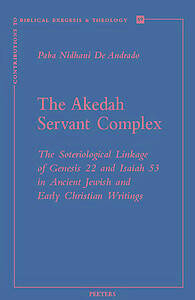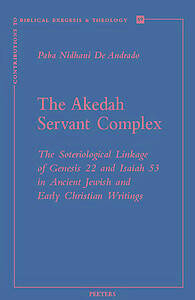
Bedankt voor het vertrouwen het afgelopen jaar! Om jou te bedanken bieden we GRATIS verzending (in België) aan op alles gedurende de hele maand januari.
- Afhalen na 1 uur in een winkel met voorraad
- In januari gratis thuislevering in België
- Ruim aanbod met 7 miljoen producten
Bedankt voor het vertrouwen het afgelopen jaar! Om jou te bedanken bieden we GRATIS verzending (in België) aan op alles gedurende de hele maand januari.
- Afhalen na 1 uur in een winkel met voorraad
- In januari gratis thuislevering in België
- Ruim aanbod met 7 miljoen producten
Zoeken
The Akedah Servant Complex
The Soteriological Linkage of Genesis 22 and Isaiah 53 in Ancient Jewish and Early Christian Writings
Pn De Andrado
€ 91,95
+ 183 punten
Omschrijving
This book traces the convergence of two biblical texts, Akedah (Genesis 22) and the Fourth Servant Song (Isaiah 53) in early Jewish and Christian writings. The passages share verbal and conceptual resonances, including the suffering of a righteous individual, divine complicity in an unjust death, unresisting compliance, notions of cultic sacrifice, exaltation and reward. Given their intertextual links, the two passages have been associated together in some ancient texts, within contexts of suffering righteousness and sacrifice. This book labels the apparent convergence of the primary texts as the Akedah Servant complex, and it develops a dialogic intertextual approach to determine the presence of the complex in selected passages: Stage I/ pre-70CE Jewish writings; Stage II/ New Testament; Stage III /post-70CE (rabbinic and patristic) texts. This study indicates that the linking of Isaiah 53 and Genesis 22 is a long-standing tradition which resulted in shaping an early Christian model of atonement.
Specificaties
Betrokkenen
- Auteur(s):
- Uitgeverij:
Inhoud
- Aantal bladzijden:
- 306
- Taal:
- Engels
- Reeks:
- Reeksnummer:
- nr. 69
Eigenschappen
- Productcode (EAN):
- 9789042929043
- Verschijningsdatum:
- 13/08/2013
- Uitvoering:
- Paperback
- Formaat:
- Trade paperback (VS)
- Afmetingen:
- 150 mm x 229 mm
- Gewicht:
- 430 g

Alleen bij Standaard Boekhandel
+ 183 punten op je klantenkaart van Standaard Boekhandel
Beoordelingen
We publiceren alleen reviews die voldoen aan de voorwaarden voor reviews. Bekijk onze voorwaarden voor reviews.









